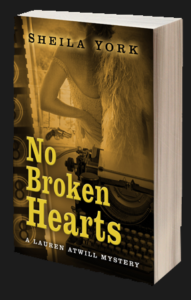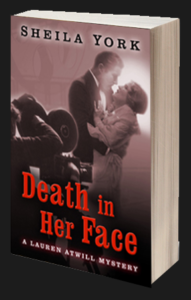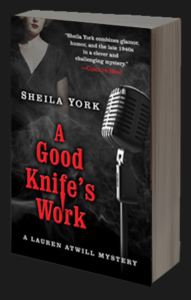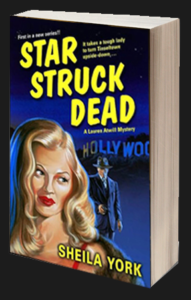A Good Knife’s Work
CHAPTER 1
Pasadena, California
Seven Weeks Earlier
I never thought that I’d end up in another murder case.
Until the first day of that summer, I’d never been closer to a crime than my typewriter. Then for the next six weeks, I was closer than I ever wanted to be again. But that was before I met Hazel Keane and before I knew that I would have to leave California. As it turned out, both events occurred on the same day. Friday, September 13.
At eight o’clock in the morning, I was already sitting at my desk in my home in Pasadena, having been awakened an hour before by the first phone calls from reporters.
The study door opened. A man with a gun walked in.
He was dark and fit, in his late thirties, about six foot two of the kind of trouble most women like to get into. He closed the door and walked over to me slowly, giving me a glimpse of the Colt M-1911 under his left arm. It was a big gun for a man to carry concealed. It was the sort of gun a man wore when he wanted people to know he was carrying it.
I swiveled my chair to face him, crossed my legs, and regarded him steadily. “Who the hell are you?”
He took a good look at what he could see of my bare legs beneath my summer skirt before he said, “I heard you might need a little help.”
“And you think you’re the man for the job?”
He pulled me to my feet and spent some time proving that, in fact, he was. Then I said, “Some bodyguard you are. I haven’t seen you for a week.”
“I’ve been working a case.”
“Hmm.”
He slid his hands down my back, over my hips and pressed me to him. He kissed me again, taking his time, which was just fine with me. Then he said, “It’s getting worse.”
“I’m out of practice and whose fault is that?”
“I meant outside.”
“Ah.” Reluctantly, I eased out of Peter Winslow’s arms and went over to the windows, pulled the draperies back a couple of inches and took a look at my front lawn.
He was right. He usually was.
At the end of the drive, dozens of reporters, some with cameras and all with determined faces, were teeming on the sidewalk, held back by some of Peter’s men. Radio, newspapers, newsreels, news services, news magazines, fan magazines, and probably foreign press as well. The last time I’d looked out, there had been six.
He closed the drapes. “Don’t let them get a shot of you. It makes you look furtive.”
“Furtive?”
“I like to use a dictionary once a month.” He took off his hat and tossed it onto the sofa.
“We had to take the phones off the hook,” I said.
“Johnny told me.” Johnny was Peter’s younger brother, who had spent much of the last two months recovering from bullet wounds suffered in an attack that had nearly cost me my life as well. He had just returned to duty, acting now as one of my bodyguards, protecting me from the possibility that the killer I had caught that summer might arrange some revenge.
“We’ll get someone over here to answer the phones,” Peter said. “I brought some more men. They’ll keep them off the yard and out of your trees.”
“My trees?” There was a knock on the door. I wiped a bit of lipstick off Peter’s face before I said, “Come in.”
My housekeeper, Juanita, brought in a coffee tray and set it down on the table in front of the sofa.
“Have you had breakfast?” she asked Peter.
“I’ll get something later.”
“Why don’t you fix some eggs?” I said to her.
“I’m fine,” Peter said.
“I’ll need to go to the market to feed all these new men,” she said to me.
“Don’t worry about the men,” Peter said.
“Don’t go alone,” I said.
She nodded and went out, closing the door after her.
Peter said, “I like the way the women in this house pay attention when I say something.”
“We’re good at it.” I went over to him and we made up a little more for lost time.
While I straightened my clothes, Peter poured himself a cup of coffee and went back to work. He called Sam Ross, a producer at Marathon Studios, which our investigation had tossed into a scandal and then saved from the worst of it. So grateful was the studio that they’d hired me to write a couple of screenplays for them.
Peter convinced Sam to send over a secretary, at the studio’s expense, to be the villain who wouldn’t let reporters talk to me. Then he handed me the phone. “He wants to talk to you.”
As usual, Sam shot me a series of questions before he paused for an answer. “Hey, how are you? How’s my favorite blonde I’ve never been married to? You doing all right? You holding up? Hey, got a question for you, okay? You know that radio show Adam Drake, that detective show? You know it? We’re thinking about doing a picture, you ever listen to it? Think you might be interested in writing it?”
He took a breath, and I stepped in. Yes, I said, I knew it, and yes, I might be interested.
“Good. We brought the producer out here. Hazel Keane. She wants to meet you.”
“You want me to audition for a radio producer?”
“No, no. It’s a meeting. That’s it. That’s all. A meeting.”
“I’m having a little trouble getting out of the house.”
“We’ll work it out. Call her. She’s at the Beverly.” He rat-tatted a phone number and hung up. I disconnected, then laid the receiver down on the desk top.
There was another tap on the door, and Juanita rolled a chrome bar cart into the room: a crystal pitcher of orange juice, a china serving dish piled with ham and bacon, a silver rack of toast, and a small chafing dish full of a fluffy, lightly browned French omelet stuffed with cheese and onions. Peter’s favorite.
When she had gone, I said, “She likes you.”
“That’s why she scowls at me.”
“She’s naturally suspicious of men, but she appreciates one who saved my life. Twice.”
I loaded plates for us, and we sat there and ate like a couple of ordinary people, not a private detective and his client who had fallen in love while solving a case that, given the identities of the participants—guilty and innocent—was proving to be one of the biggest in California history. For the last six weeks—through the delays contrived by the defense attorney—the D.A. had tried to keep my identity a secret, which meant that Peter and I hadn’t been able to see each other often. The reporters knew he was involved, and he didn’t want to lead them to me. But too many other people knew that I was the woman who had hired him. It was inevitable the press would find out.
Apparently, they didn’t yet know the extent of my involvement—that I was the one who had, in fact, identified the killer—but I was married (although separated for well over a year) to Franklin Atwill, one of Marathon’s stars, and he had managed to get himself into some trouble in connection with the case, through a little but not much of his own fault, and that was plenty for the press.
But I couldn’t talk to them. How would I answer their questions? Why did you hire Winslow? Because, for no reason that made any sense, I was being blackmailed. And, oh yes, my husband might have been involved.
When the secretary arrived, we set her up in the telephone alcove in the foyer and put the phone back on the hook. It rang immediately.
“Let me get you a drink,” Peter said, “then go on up and get some rest.”
“A light one.” The usual strength of Peter’s cocktails would render me incapable for the entire day. He brought me back a mild gin and tonic, full of ice. I thought it would make a perfect afternoon if I could spend it in bed with him and some iced cocktails, but it wasn’t possible, so I went up to my bedroom alone and took off my clothes. Alone.
I unplugged my extension, put on my dressing gown and started running a bath. I poured some salts under the tap, and while they foamed, went back to the bedroom, re-plugged the phone and eased the receiver out of the cradle. When I heard the dial tone, I pulled out the number Sam had given me and called the Beverly Hills Hotel. During the Depression, that grand old lady had fallen on hard times, but she was now refurbished and fashionable again. Marathon placed its special guests there—the ones who didn’t require private bungalows to pass their spare time with orgies.
I asked for Hazel Keane. She answered the phone herself, a little breathless.
“I hope this isn’t a bad time,” I said when I had introduced myself.
“I was halfway down the hall when I heard the phone ring. I was headed to the beach. Is it like this out here all the time?”
“Sunshine, blue skies, clean water. It toughens you up.”
She laughed. She had a good laugh, a good voice, warm and low-pitched; if she was a native New Yorker, she’d made a determined effort to get rid of her accent. Every once in a while, as we talked, a vowel that should have been “ah” veered toward “aw,” but that was it.
“Why don’t we get together?” she said. “I’ve heard a lot about Chasen’s, but I won’t be back before lunch.”
“Chasen’s isn’t open for lunch.”
“Then we better make it dinner.”
I explained about my constant companions.
“I saw the stories. Hell with them,” she said. “Come have some dinner. I’ll get Marathon to make the reservations.”
“Do you have an escort?” I asked.
“I’m sure the studio can take care of that.”
“If you don’t mind, I’d rather not get a stranger involved. I’ll bring the man. I’ll have the studio leave the reservation under your name.”
“Fine. Don’t worry about people staring at you. I’m so gorgeous, they won’t give you a second look.”
“I’ll be the tall blonde with the reporter wrapped around her ankle.”
“I’ll be the redhead in the scarlet suit.”
Peter put on his best suit and a smaller gun. Johnny drove and quickly lost the posse of press that tried to tail us. He parked the car deep in Chasen’s parking lot, and since any car that I rode in these days was never left unattended, he stayed with it.
When David Chasen saw me, he took charge himself. A small man with thick horn-rimmed glasses—at five-three, he barely came up to my shoulder—he was dressed as always in perfect formal clothes, with his trademark red-silk-lined jacket. David’s first career was playing the stooge in a comic Vaudeville act, the second banana who never spoke and took all the punishment, but he had found his true calling cooking up pots of chili for the casts backstage. Chasen’s had begun as a chili-and-ribs joint, became a hangout for Hollywood, and was now a lavish, phenomenally successful restaurant, constantly expanding.
Our party didn’t rate a table in the front “red room,” named after its ten deep-red semicircular leather booths, but a call from Marathon could get us a booth in the “green room” next door. The people we passed, used to others looking at them, hardly glanced at us.
Hazel Keane did indeed have red hair. Judging from the brows, it had originally been a rather ordinary shade of earthy brown but had been mined enthusiastically to gleaming copper. She wore an evening suit that had obviously been made for her. It fit in the way only personally tailored clothes do, with perfect smoothness through the shoulders and without a pucker or roll at the waist. It had small, scalloped cut-outs just below the collar bones, the latest fashion. Her evening hat fit close to her head and its soft spray of feathers brushed her temple.
Her face had good, strong bones, but not in an arrangement that usually led to the word handsome. She’d been tough on her naturally fair skin, too. Beneath the flawless make-up, there were heavy splashes of freckling and deep lines at the corners of her eyes. She looked as if she’d be more at home steering a sailboat or training horses than sipping champagne in a six-hundred-dollar suit.
“So,” she said, “I’m not gorgeous.”
I laughed, then introduced Peter. “I’m Mrs. Atwill’s bodyguard,” he explained.
“Does that mean I can’t talk to you?”
“I don’t need to be entertained.”
“You’d be the first man. Sit down.” She slid to the center of the booth. Peter motioned me into the seat on her right, and he took the other one, the one with the better view of the entrance.
“What are you having?” Hazel asked me.
“Champagne sounds good,” I said.
“Nothing for me,” said Peter.
David Chasen raised his hand for the waiter, who materialized a second glass and filled it from the bottle in the free-standing silver bucket. David handed us menus and left us alone. I took a sip and told Hazel how much I liked Adam Drake. She stripped off her gauntlet gloves and tossed them down on the table.
“All right, what’s the name of Adam’s secretary?”
I blinked at her. “Maisie Lane.”
“What was last week’s show about?”
“Adam rescued a kidnapped actress in time for the curtain.”
“What’s Adam’s favorite bar?”
“O’Malley’s. The owner’s called Tack. He’s an ex-cop. I take it a lot of people out here are telling you how much they love the show.”
“They apparently listen to it all the time, even when they don’t know what night it’s on.” She reached for the menu. “So, what do you recommend?”
“The chili’s great. Or the chicken curry or sole.”
“I don’t see chili.”
“It’s not on the menu, but you can get it if you know to ask.” She didn’t examine the menu further. We ordered the chili. We agreed that it would go well with champagne. Peter ordered the butterflied steak.
She said, “I don’t want my show turned into some knock-it-out B movie. I need a star, but a star won’t do it unless he knows there’ll be a first-rate script.”
I conceded that was true. Any star would be reluctant to play a character another actor had already made famous, even if that actor was only a voice.
“Of course, the money’s tempting,” she said. “I had no idea how much of it you people have out here.”
“Which agency do you work for?” Almost all of the shows on the networks were created by advertising agencies for sponsors. The networks did little but sell time on the air.
“I don’t. The D.W. Davis agency represents Miles and Foster Tobacco. They make Traveler cigarettes, our sponsor, but my family owns the agency, so I don’t have to answer to any twenty-eight-year-old vice president.”
“Uh,” I said. “You wouldn’t be Keane as in Keane Radio, would you?”
“My father was. It gave me a leg up.”
“I’ll bet.”
“I started out acting, even did the Lux Theater, when it was still in New York. Between us, I stunk.”
The Lux Radio Theater had started in New York, but moved to Los Angeles ten years ago and since then had mostly presented Hollywood stars recreating their roles in one-hour versions of their films. It had a huge audience and a hefty budget from Lux soap. My husband once made three thousand dollars for recreating his role in a movie I wrote for him called The Brantley Case. As the hired pen on the picture, I got nothing.
Hazel continued, “I was always a better writer. My brothers did some acting, too, but what we really wanted to do was produce our own shows. We started with a soap opera. But Adam Drake was always my dream. How about you?”
“My uncle was Bennett Lauren, the oil man. I was named for him. Mabel Lauren Tanner’s my maiden name. He helped me get a job. The studio told me I could be a secretary. I wanted to be a writer. We compromised. They let me write, but they didn’t use anything. Then I got a break with The Brantley Case. After that—”
“I know your work. Why’d you stop writing?”
“I didn’t.”
“I haven’t seen your name on anything in three or four years, except that Scarlet Spy a few years ago.”
I flinched. “I hope you don’t count that.”
“You owe me a quarter. I only went to see it because your name was on it.”
“It went through two other writers. I’ve had a hand in several scripts in the last few years, off the record.”
“A script doctor?”
“I was married,” I said, a bit defensively, determinedly not looking at Peter. Instead my eyes dropped to her left hand. There was a simple gold band and a diamond not quite as big as Cleopatra’s Needle.
“My husband directs Adam Drake.”
That was all she said about him, and all we said about the show. There wasn’t much to be done at this stage. She wasn’t looking for ideas. She was seeing if she trusted me, so we talked about inconsequential, vital things. It turned out that we had quite a bit in common. We were both writers who loved to work on mysteries. We had both gone to Vassar. We knew the same professors and the same ways of getting around them, which had mostly required that we admire their opinions with wide-eyed enthusiasm, the more unoriginal the idea, the greater the enthusiasm. It had been great training for the entertainment business.
We had both been left wealthy by men we adored. We spent most of that evening talking about my uncle and her father.
When we finished, David Chasen brought the tab himself, which Hazel signed to the studio. “I’m afraid someone told the press you were here,” he whispered to Peter.
Peter suggested Hazel wait and take a cab back to the hotel. We said goodbye and Peter walked me to the front door, where I stayed with David, out of sight of the crowd on the curb while he went to get the car. When he returned, he said, “Don’t cover your face, but don’t look at them. And don’t frown.” He took me by the arm and propelled me out the door, across the sidewalk beneath the green-and-white awning, and into the back seat. He jumped in after me and slammed the door.
Faces pressed against the car windows.
“Lauren! Lauren, is it true there was blackmail? What do you know about the killings? Why did you and Frank separate?”
And then, just as we pulled away from the curb: “Did you hire Winslow because you thought Frank was a killer?”



